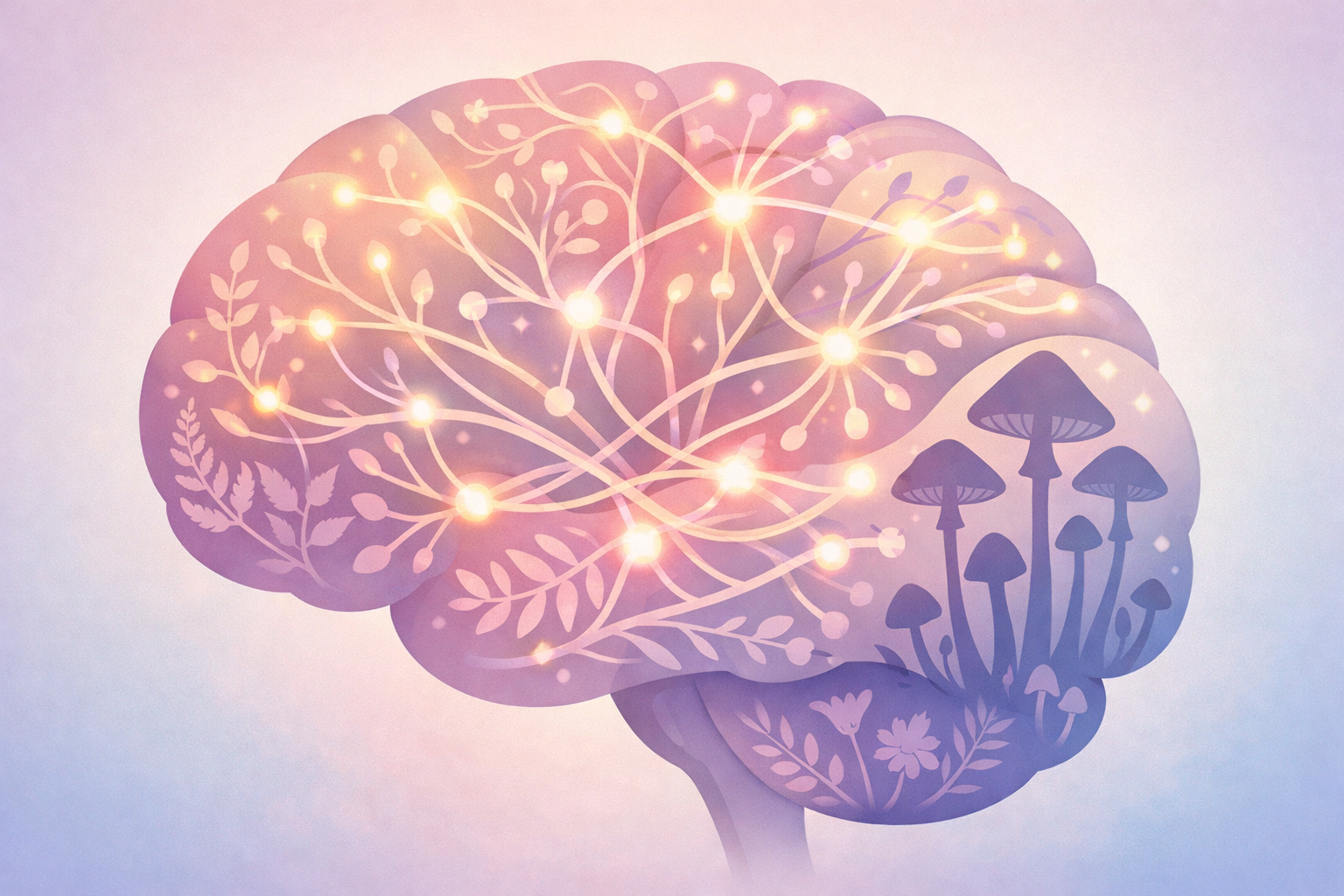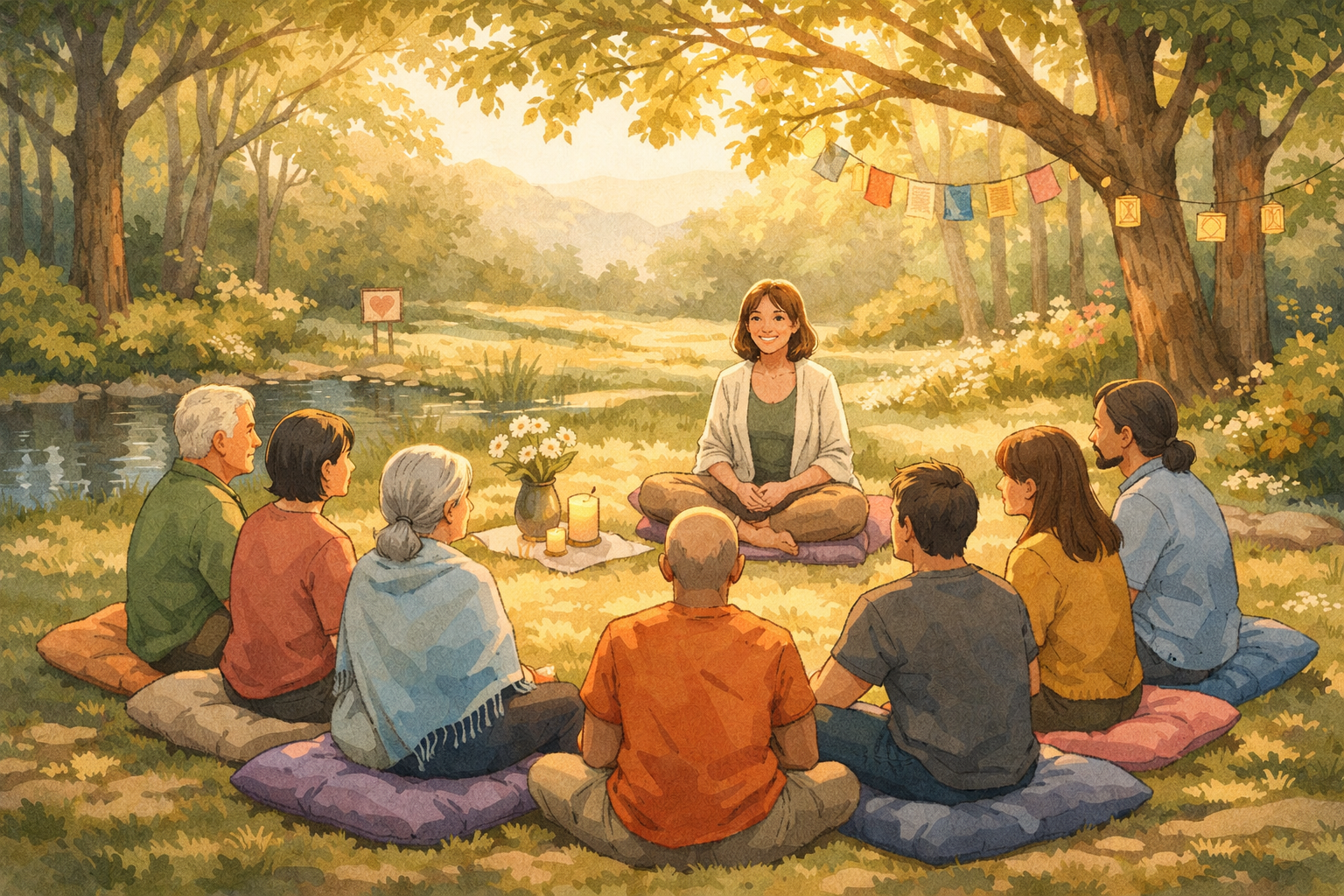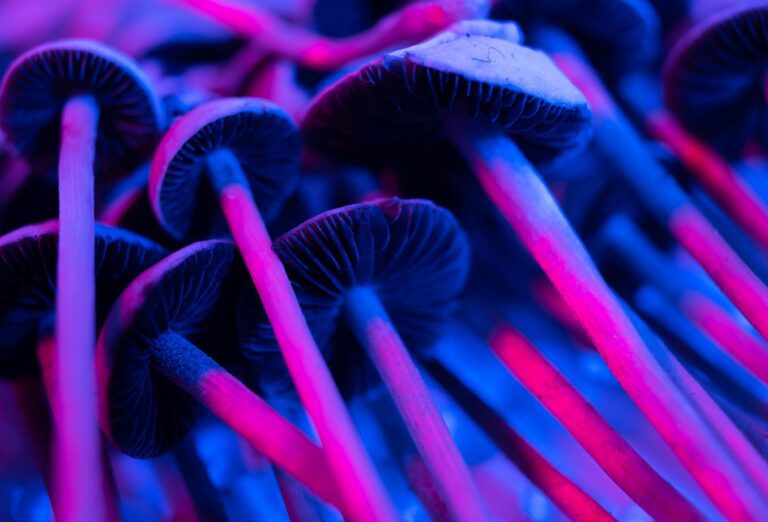Sometimes, when we get carried away with being productive, we end up not feeling still or present during the day (or at least, not for very long). Of course, this need to be busy is often outside of our control – we just need to keep up with the demands of work and home life. However, this doesn’t mean we can’t take a break and find something else we feel is missing: a feeling of deep stillness and presence, a return to ourselves.
This is exactly what psilocybin retreats can offer: a break from noise and the need to be busy. During these retreats, individuals can safely explore altered states of consciousness, which often leads to personal insights, emotional catharsis, and a greater feeling of authenticity.
But what exactly happens at a psilocybin retreat? And why are some of the world’s leading researchers paying such close attention to them?
Let’s explore the science and the stories that highlight why psilocybin retreats are a powerful catalyst for transformation.
What is a Psilocybin Retreat?
A psilocybin retreat is a professionally guided experience in which participants ingest psilocybin – a naturally occurring psychedelic compound found in certain mushrooms – in a supportive, structured environment. These retreats are designed with intentionality and care. They include preparation sessions, guided ceremonies, integration support, and community connection throughout.

At Beckley Retreats, the approach integrates decades of scientific insight with ancient contemplative practices. Retreats typically take place over five days in natural surroundings in Jamaica or the Netherlands, where psilocybin use is legally permitted.
The aim of a psilocybin retreat isn’t to escape reality, it’s to engage with it more fully.
Why People Attend Psilocybin Retreats
People come to psilocybin retreats for a wide range of reasons. Some want to reflect on their current life situation, reset their way of thinking, or reconnect to themselves and their emotions. Others are navigating life transitions. And others still are simply seeking clarity to a personal problem, a burst of creative inspiration, or a break from routine.
While everyone’s path is unique, at Beckley Retreats, we have observed a general intention that people bring, to become more deeply aware of their mind.
The Science of Psilocybin
Over the last 20 years, psilocybin has reemerged as one of the most rigorously studied psychedelics in modern science. Dozens of academic institutions – including Johns Hopkins University, NYU, and Imperial College London – have published peer-reviewed research on the potential of psilocybin to alleviate emotional distress in a controlled, supervised setting.

While Beckley Retreats does not claim to treat or diagnose any condition, here’s what the research reveals more broadly:
1. Enduring Psychological Benefits
In a landmark 2020 study, researchers at Johns Hopkins found that two doses of psilocybin, combined with psychological support, produced “large, sustained decreases in depression and anxiety” in 71% of participants, with benefits lasting at least four weeks post-session (Davis et al., 2020).
2. Increased Sense of Meaning and Connection
A 2022 study in JAMA Psychiatry followed participants a year after their psilocybin session. Nearly 75% rated the experience among the most personally meaningful of their lives. Many reported increased openness, connection to others, and life satisfaction (Griffiths et al., 2006).
3. Enhanced Brain Flexibility
Neuroimaging from Imperial College London shows that psilocybin temporarily disrupts the brain’s default mode network (DMN), a region associated with self-criticism and rumination, while increasing communication between previously disconnected brain regions (Carhart-Harris et al., 2016). This is thought to support new perspectives and emotional breakthroughs.
These aren’t fleeting effects. When paired with proper integration – which might include reflection, journaling, and community support – many people report sustained changes in how they relate to themselves and the world around them.
Indeed, a psilocybin retreat is not the end of the journey, nor should it be thought of that way. We don’t claim that a single retreat will be able to solve any complex personal or emotional issues that individuals are struggling with. Instead, psilocybin retreats can act as one (but highly important) stepping stone towards transformation. By nurturing the insights that occur during a retreat, long after the retreat is over, long-term positive changes become more likely.
What Happens During a Psilocybin Retreat?
At Beckley, a psilocybin retreat unfolds across three key stages:
1. Preparation
Participants receive guidance weeks before arrival. This includes:
- Intention-setting: thinking and writing down what one hopes to gain from the retreat.
- Reflection exercises: activities like journaling or mindfulness can help one gain greater insight into one’s intentions and which ones stand out as the most important.
- Video calls with facilitators: speaking with facilitators allows individuals to become better acquainted with who will be supporting them during their experience, which helps put them at ease. It’s also an opportunity to better learn what to expect from the retreat experience, as well as strategies and grounding techniques that can help one navigate altered states.
Groundwork is everything – this stage helps establish trust, clarity, and emotional safety.
2. Immersion
During the retreat, participants engage in guided psilocybin ceremonies, supported by trained facilitators and surrounded by nature. There’s also breathwork, meditation, and group connection, all of which can enhance the overall experience. Every element of the psilocybin experience – including the music, setting, and pacing – is designed with care. We draw on best practices from clinical trials that have been shown to facilitate deep and immersive inner journeys.
3. Integration
The days following the ceremony are devoted to reflection, sharing circles, and contemplative practices. This integration phase is when participants begin making sense of their experiences and translating insights into daily life. Follow-up support continues for weeks after returning home, as we understand that powerful journeys can leave participants still processing a lot of material in the days and weeks following the retreat. This ongoing support can be especially helpful if any material feels confusing, ambiguous, or challenging.
Why “Set and Setting” is Crucially Important
Set and setting – your mindset and your environment – have a profound influence on any psychedelic experience.

In both clinical trials and retreats, participants often describe feelings of awe, connectedness, and release. But these effects depend on feeling safe and supported. At Beckley, we believe transformation doesn’t happen in isolation. It is best supported by a caring community, as feeling strongly connected to others is an essential aspect of well-being. It’s what makes us human..
Our facilitators are trained in trauma-informed support, and our programs are built on decades of research and retreat experience. Every aspect of the preparation, immersion, and integration phases has been designed with set and setting in mind.
Beyond the Science: Participant Stories
While we steer away from making any generalized claims, we find that individual stories speak volumes.
A recent Beckley participant described the experience this way:
“It felt like I remembered something I’d always known but had forgotten, a sense of belonging to myself and the world. I came back with more clarity, more compassion, and the courage to make changes I’d been avoiding.”
Many participants report improvements in their creativity, sense of purpose, emotional openness, and relationships with loved ones. For some, the retreat becomes a marker in their timeline – before which they may have felt stuck, and after which they may think, feel, and act in a way better aligned with self-growth.
The Emphasis is on the Experience
At its core, a psilocybin retreat isn’t about a substance. We recognise, as the science informs us, that psilocybin can have remarkable effects on neuroplasticity. Its ability to make neural connections more ‘plastic’ and flexible helps explain why psilocybin helps many people get out of ruts of ruminaton. But ultimately, the retreat is about the experience – the felt qualities of of presence, care, and hopefulness for the possible futures that can be carved out.
Psilocybin retreats, like those offered at Beckley, provide an opportunity to participate in a new chapter of personal growth.
Frequently Asked Questions
When facilitated properly, psilocybin retreats can potentially decrease your anxiety while creating more emotional openness. These emotional changes enable you to think differently about problems and relationships, allowing you to evaluate your life from a new perspective.
When facilitated properly, psilocybin retreats can potentially decrease your anxiety while creating more emotional openness. These emotional changes enable you to think differently about problems and relationships, allowing you to evaluate your life from a new perspective.
A retreat may be right for you if you’re seeking a structured space for deep self-reflection and personal growth. It is for those looking to reflect on their lives, reset thought patterns, or reconnect with their emotions and sense of purpose.
Yes. Psilocybin can help quiet the brain’s tendency to ruminate, allowing you to find new perspectives and emotional relief. Some executives claim it also helps them think more creatively and deeply about what is truly important to them (in work and life).
While the provided article does not detail a packing list, it emphasizes the importance of “set and setting”, your mindset and environment. The focus is on preparation, including intention-setting and reflection exercises, to ensure you feel safe and supported during the experience.
Sources
- Davis, A. K., et al. (2020). Effects of Psilocybin-Assisted Therapy on Major Depressive Disorder. JAMA Psychiatry.
- Griffiths, R. R., et al. (2006). Psilocybin can occasion mystical-type experiences having substantial and sustained personal meaning and spiritual significance. Psychopharmacology.
- Carhart-Harris, R. L., et al. (2016). The entropic brain: a theory of conscious states informed by neuroimaging research with psychedelic drugs. Frontiers in Human Neuroscience.

Admin
-2-1.png)
